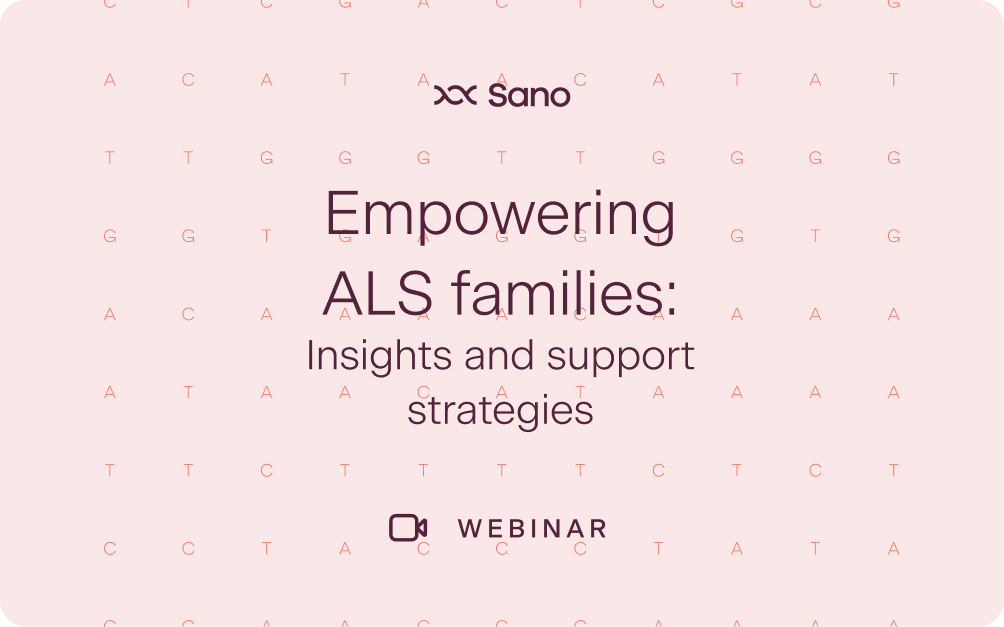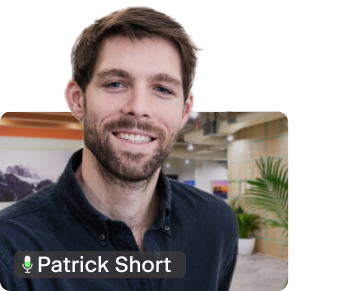Webinar recap: Empowering ALS families with insights and support strategies

This webinar, hosted by Sano CEO Dr. Patrick Short and featuring Daniel Barvin and Dr. Paul Wicks, offered an in-depth exploration of the challenges and advancements in the field of ALS (Amyotrophic Lateral Sclerosis), particularly focusing on the genetic forms of the disease.
The link to the full webinar is here; a brief summary is below for easy reference.
About the speakers
Patrick Short
Patrick Short is a Cambridge-trained PhD geneticist with experience researching large-scale genome sequencing and rare disorders. He is dedicated to driving the world’s transition to precision medicine through Sano, which combines genetic testing, recruitment, and long-term engagement in one platform, accelerating enrollment and simplifying operations for precision medicine studies.
Daniel Barvin
Daniel Barvin, the VP of Operations and Patient Advocacy at Coya Therapeutics and co-founder of End the Legacy, brings a personal connection to ALS. His experience with familial neurodegenerative diseases drives his commitment to community advocacy and resource development, particularly for genetic forms of ALS.
Paul Wicks
Paul Wicks is a neuroscientist and an ALS patient advocate with a rich background in clinical research and digital therapeutics. His work in understanding the cognitive and behavioural aspects of ALS, combined with a personal connection to the disease, positions him as a vital voice in the ALS community.
Highlights from the webinar
Daniel Barvin shared his personal journey in which his family's battle with various neurodegenerative diseases, including ALS and FTD (Frontotemporal Dementia), revealed a genetic predisposition to these conditions. This discovery led him to co-found End the Legacy, aiming to provide community advocacy and resources specifically for genetic forms of ALS. Daniel emphasised the necessity of challenging the status quo in ALS treatment and advocacy, advocating for change and better resources for the ALS community.
Paul Wicks brought a different perspective, stemming from his extensive research in cognitive and behavioural changes in ALS patients. He described the historical neglect of these aspects in ALS patients and underscored the importance of understanding the broader implications of the disease, including the genetic aspects.
The conversation then shifted to the challenges faced by families dealing with ALS. Daniel pointed out the significant financial burden, which can amount to $1.5 million per patient, and the emotional toll it takes on families, especially when they lack prior knowledge of their genetic risk. He stressed the importance of awareness and engagement in the ALS community to access available resources.
Paul discussed the landscape of genetic testing and counselling, emphasising the evolution of the field with new treatments and family planning options becoming available. He highlighted the challenges in genetic counselling and the need for a more comprehensive approach in identifying genetic risks in ALS.
The webinar also shed light on innovative initiatives like Light the Way, which offers an online platform for education, genetic counselling, and testing for individuals at risk of genetic ALS. Light the Way aims to provide comprehensive support, including intervention in research trials and family planning guidance.
Summary
This webinar underscored the critical need for continued advancements in ALS research and advocacy. Despite the complexities and challenges presented by the disease, there is a growing optimism surrounding new treatments and approaches, offering hope for better management and outcomes for those affected by ALS.
.png)


.png?width=289&height=291&name=Group%2048095530%20(4).png)
